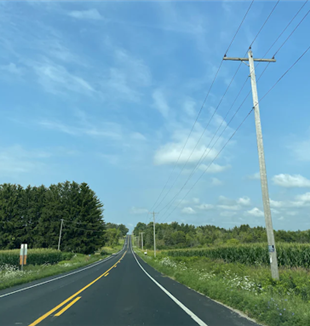
Walking in Order to Discover
“We can't walk down the street and look at others' faces without feeling a yearning, a poignant desire to save them. It is within this yearning that one saves oneself.”I decided to go on the Pilgrimage after the CL university student vacation in Colorado because I was deeply touched by the people I met there and the friendships I formed. We arrived in Mishicot on August 11th, and it was exciting to reunite with friends from CLU. I was especially happy to see some of them after a long time of not seeing each other.
On the 12th, we began our walk to the Shrine. I had a sleepless night as I was sleeping on the floor and couldn't fall asleep, leaving me very tired. After walking 15 miles that day, we reached the next parish that was hosting us, and I was extremely fatigued. My feet were hurting considerably due to my tight shoes, and my legs were also in pain since I'm not used to walking so much. Additionally, most of the walking was done in silence or prayer, which were a little unfamiliar to me, making the Pilgrimage quite challenging. The second day was even tougher; I was very tired, and my feet were in even more pain. I just wanted to finish the pilgrimage as quickly as possible, mainly because I didn't understand the purpose of what I was doing. I had come to stay with friends, and this form of being together wasn't the best fit for me.
By this point, I had decided that I would never do something like this again. So, before dinner, I asked some friends why they were engaging in these activities since I was the only one complaining so much, and no one else seemed as disillusioned as I was. The conversations I had that evening marked a turning point in my perspective on the Pilgrimage. We discussed the significance of the sacrifices and prayers we were making during those days. Our presence there wasn't solely for our own sake, but to offer our sacrifices and prayers for the people we care about and for the intentions in our hearts. Two things were instrumental in helping me grasp this.
First, we are Catholic Christians. We believe in the crucifixion of Jesus, and this belief calls us to participate in suffering. As Father Giussani puts it: "Vocation" means being specifically called to this, to make it inevitable for us: to engage in the action for which Christ died to redeem and save humanity. We can't walk down the street and look at others' faces without feeling a yearning, a poignant desire to save them. It is within this yearning that one saves oneself. This perspective led me to a deeper understanding of what I was undertaking. I wasn't just there for myself; my pain and sacrifices were intended to aid and pray for the people I love. I was present to offer all my fatigue and effort for the intentions in my heart and also to serve as a witness to my experiences.
Second, I believe that these words and conversations would not have had the same impact if I had read them on paper. All the friends around me were there to bear witness to this profound meaning. Whatever they did (walking, staying in silence, praying, singing and speaking with me) was for me the witness that all the “theoretical” things I was discussing with them were not merely “theoretical”.
The next day, we walked all day in the rain. My pain persisted, and the rain made walking even more challenging. However, I wasn't frustrated and resentful like the day before. In light of the way I was learning the previous day and seeing my friends walking alongside me without complaints, clearly moved by a significant purpose, I felt much more aware and content.
On the final day, upon reaching the Shrine, we knelt in front of it and sang the "Non Nobis," which proclaims: "Not unto us, O Lord, not unto us, but to Your name may all the glory be." I couldn't sing it the last time because I was so moved that my voice choked up. Indeed, that was the moment when the purpose of my participation in the Pilgrimage became most evident.
Matteo, Chicago, IL